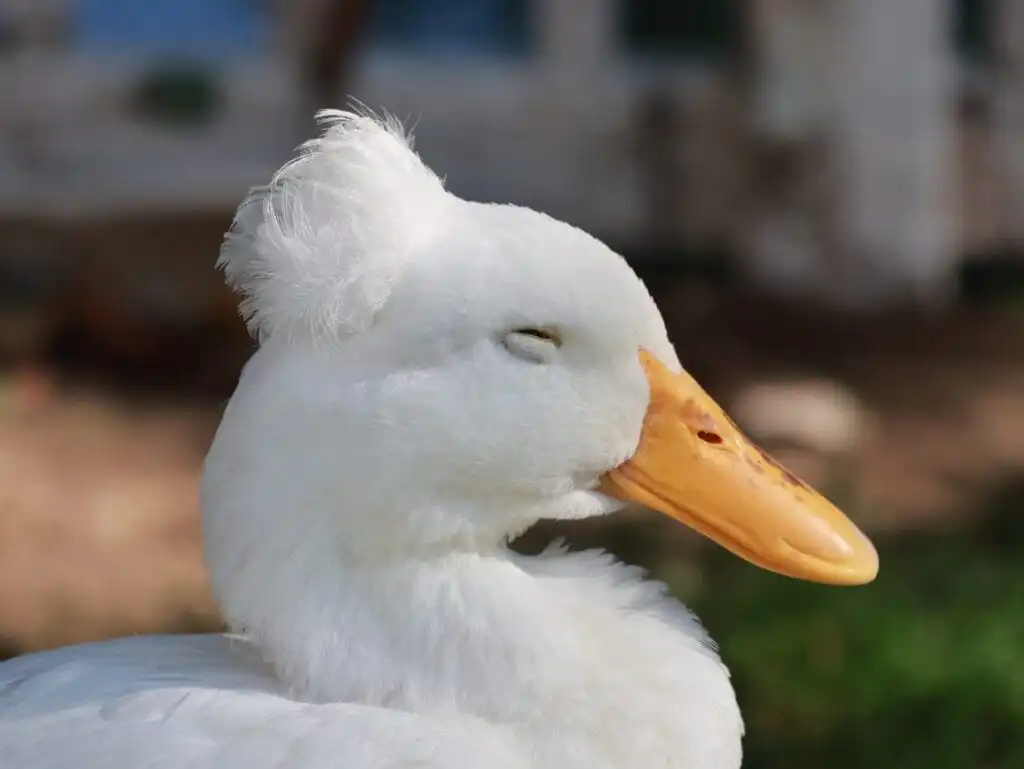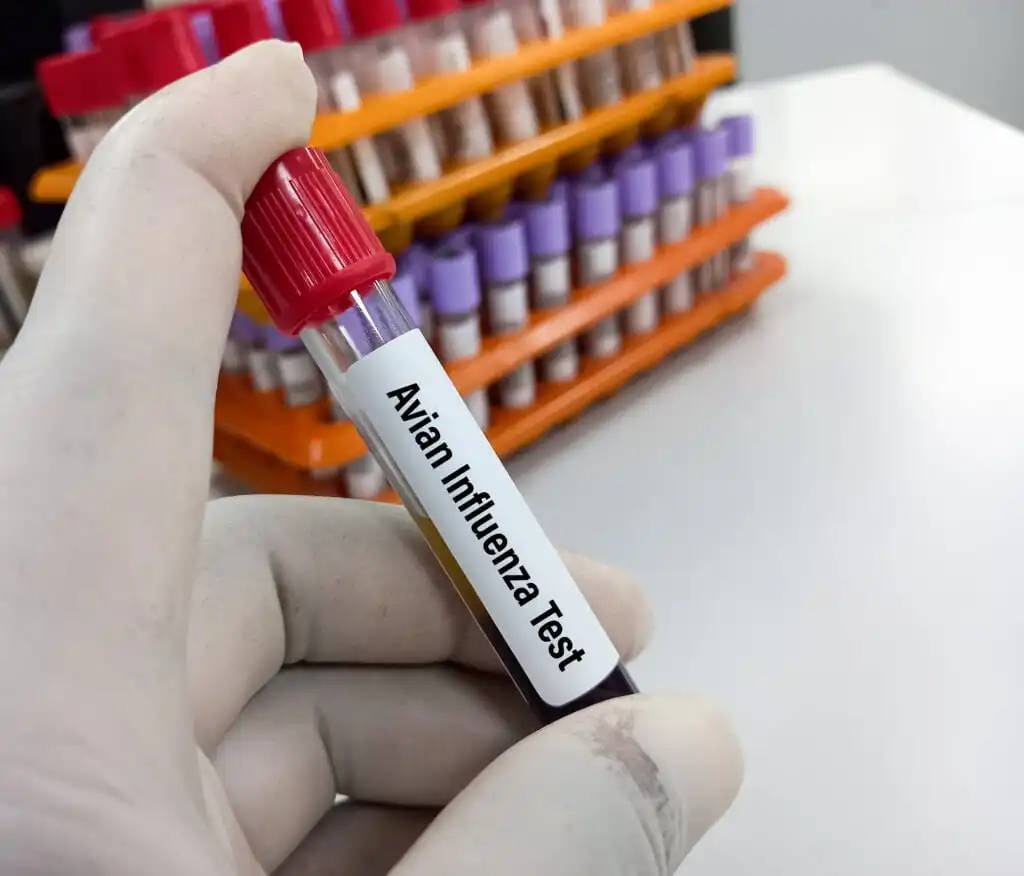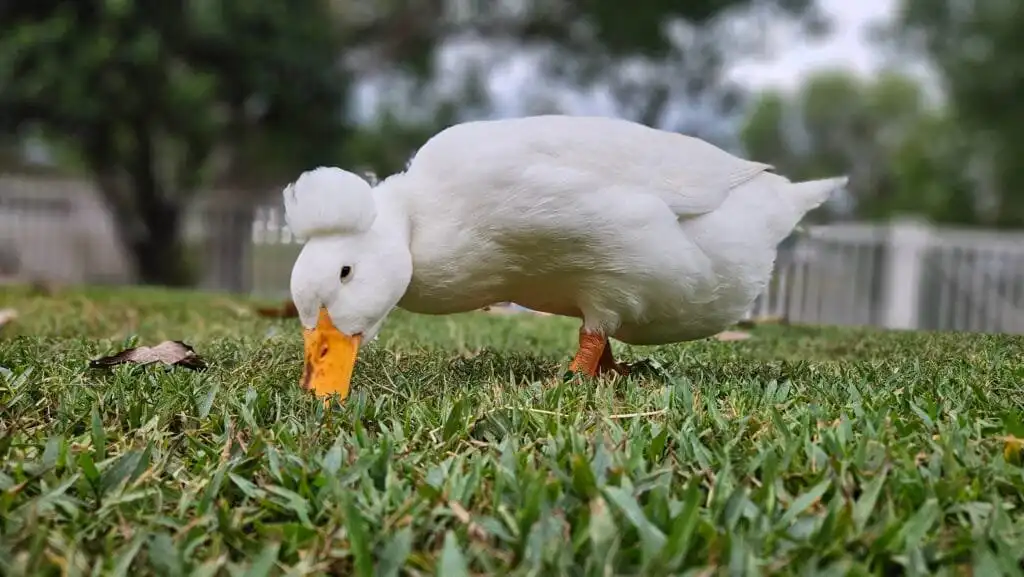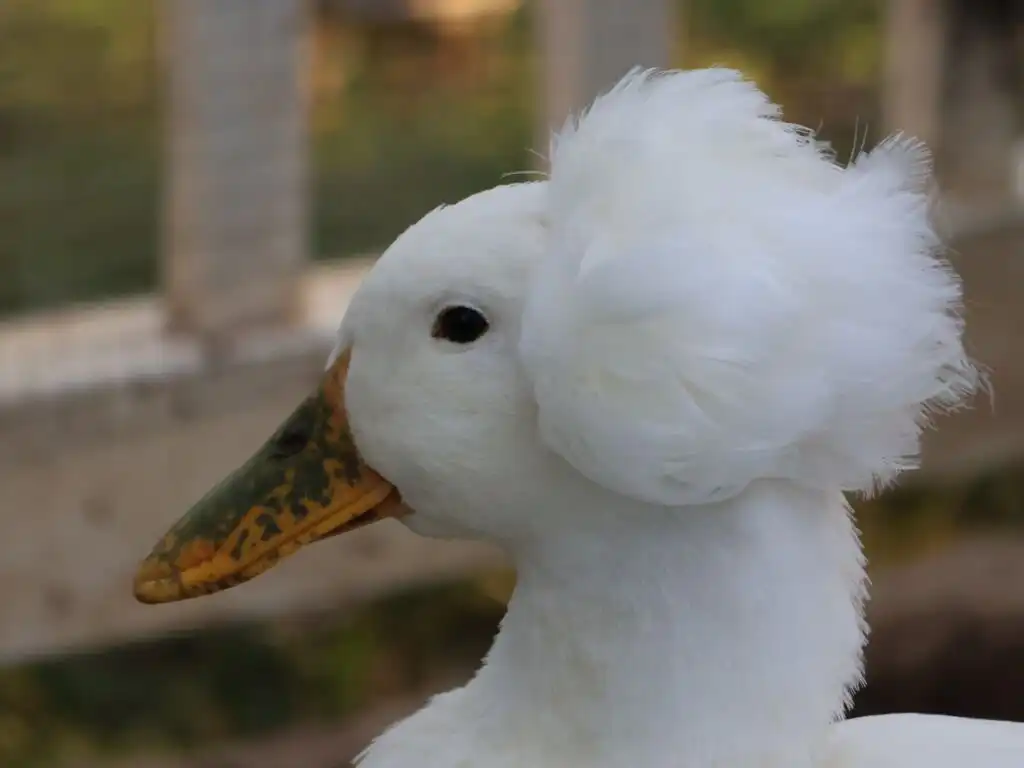
Neurological Disorders in Ducks: Why They Happen and How to Prevent Them
Last updated: February 14th, 2026
Neurological disorders in ducks can stem from various causes, including infections, nutritional deficiencies, toxins, injuries, and genetic conditions. Here’s an overview of common neurological issues in ducks, their symptoms, causes, and potential treatments.
Neurological disorders in ducks affect the brain, spinal cord, and nervous system, leading to symptoms like tremors, weakness, paralysis, and abnormal behavior. These disorders can arise from a variety of factors, including nutritional deficiencies, infections, toxins, genetic predisposition, and injuries. Ducks are particularly vulnerable to neurological conditions due to their foraging habits, sensitivity to environmental toxins, and reliance on proper nutrition for nerve function.
Ducks of Providence is free, thanks to reader support! Ads and affiliate links help us cover costs—if you shop through our links, we may earn a small commission at no extra cost to you. Thanks for helping keep our content free and our ducks happy! 🦆 Learn more
Part of the Duck Health & Anatomy Hub, Evidence-based medical resources and anatomical research.
- Common Neurological Disorders in Ducks
- Common Symptoms of Neurological Disorders
- Diagnosis and Veterinary Testing
- Treatment of Neurological Disorders in Ducks
- For the Nerds: Scientific Background on Neurological Disorders in Ducks
- Common Causes of Neurological Disorders in Ducks
- Environmental Factors
- Prevention
- Long-Term Care and Recovery for Affected Ducks
- The Role of Stress in Neurological Health
- Why Are Ducks Prone to Neurological Disorders?
- Which Ages Are Most Affected?
- Genetic Considerations: Are Some Ducks More Prone?
- Final Thoughts: Understanding and Preventing Neurological Disorders in Ducks

Common Neurological Disorders in Ducks
1. Wry Neck (Torticollis)
- Symptoms: Twisting of the neck, inability to hold the head up, circling, balance issues.
- Causes: Vitamin E and selenium deficiency, head injury, infections (e.g., avian botulism, Newcastle disease), genetic predisposition.
- Treatment: Supplement with vitamin E, selenium, and B vitamins; provide supportive care.
➡️ Read more in our article about Wry Neck
2. Botulism (“Limberneck”)
- Symptoms: Progressive paralysis starting in the legs and moving upward, inability to lift the head, difficulty breathing.
- Causes: Ingestion of botulinum toxin from decaying organic matter or stagnant water.
- Treatment: Immediate supportive care, hydration, and flushing toxins with activated charcoal or Epsom salt flush under veterinary guidance.
➡️ Read more in our article about Botulism
3. Toxic Metal Poisoning (Lead/Zinc Poisoning)
- Symptoms: Weakness, tremors, incoordination, seizures, greenish diarrhea, weight loss.
- Causes: Ingestion of lead (fishing weights, ammunition) or zinc (galvanized metal, pennies).
- Treatment: Chelation therapy (e.g., calcium EDTA), supportive care, removal of the metal source.
➡️ Read more in our article about metal poisoning in ducks
4. Viral or Bacterial Infections
- Examples: Newcastle disease, Duck Viral Enteritis, Aspergillosis.
- Symptoms: Neurological signs such as tremors, convulsions, paralysis, respiratory distress.
- Causes: Viral/bacterial pathogens affecting the nervous system.
- Treatment: Supportive care; some infections have no cure but can be prevented through biosecurity and vaccinations.
5. Aspergillosis (Fungal Infection)
- Symptoms: Weakness, ataxia (loss of coordination), difficulty breathing, tremors.
- Causes: Exposure to moldy feed, wet bedding.
- Treatment: Antifungal medications, improved ventilation, dry and clean bedding.
➡️ Read more in our article about Aspergillosis
6. Vitamin Deficiencies (Thiamine, B Vitamins)
- Symptoms: Loss of coordination, tremors, seizures, inability to walk properly.
- Causes: Poor diet lacking essential vitamins (especially in ducklings fed improper feed).
- Treatment: Supplement with appropriate vitamins, correct diet deficiencies.
➡️ Read more about the nutritional needs of ducks
7. Head Trauma
- Symptoms: Staggering, head tilt, inability to stand, seizures.
- Causes: Injury from falls, pecking, predator attacks.
- Treatment: Rest, isolation, anti-inflammatory medication under veterinary supervision.

Common Symptoms of Neurological Disorders in Ducks to Watch Out For
Ducks with neurological disorders may show a variety of symptoms that affect their movement, coordination, and overall health. Look out for:
- Wobbly walking or loss of balance – Ducks may stumble or have trouble standing.
- Head tilting or wry neck – The head may twist to one side or flop backward.
- Tremors or shaking – Uncontrollable muscle twitching or shaking.
- Seizures – Sudden jerking movements or collapsing.
- Weakness or paralysis – Ducks may struggle to move one or both legs.
- Disorientation or circling – Walking in circles or acting confused.
- Drooping wings or limp neck – Muscles lose strength, making movement difficult.
- Abnormal eye movement – Rapid darting or rolling of the eyes.
Since many of these symptoms can have different causes—like vitamin deficiencies, toxins, or infections—early diagnosis and treatment are key to helping your duck recover.
Diagnosis and Veterinary Testing
Veterinarians diagnose neurological disorders by evaluating clinical signs and conducting a series of tests to identify the underlying cause. Since many neurological disorders share overlapping symptoms, such as weakness, tremors, or paralysis, an accurate diagnosis is crucial. Veterinarians may use:
- Blood tests – To check for vitamin deficiencies, infections, or heavy metal toxicity.
- X-rays – To detect lead or zinc ingestion, or identify skull abnormalities (especially in Crested Ducks).
- Fecal testing – To rule out parasitic infections that may affect nerve function.
- Neurological exams – To assess reflexes, muscle control, and coordination.
These diagnostic tools help pinpoint the cause and guide effective treatment options for the affected duck.
Treatment depends on the underlying cause and may include vitamin supplementation, detoxification, antibiotics, anti-inflammatory drugs, or supportive care. Ducks with mild neurological issues may recover fully with proper nutrition and treatment, while severe cases may require long-term management.
Early intervention is key to preventing permanent nerve damage and improving recovery chances.

Treatment of Neurological Disorders in Ducks
The treatment for neurological disorders in ducks varies depending on the underlying cause, but early intervention is crucial for the best outcomes. Here are some common treatment options:
- Vitamin and Mineral Supplements – For ducks suffering from vitamin deficiencies, supplements like niacin (B3), thiamine (B1), and vitamin E are often prescribed. These help promote nerve health and can restore proper motor function. In cases of heavy metal poisoning, chelation therapy may be used to bind toxins like lead or zinc and help remove them from the body.
- Antibiotics and Antifungals – If an infection is identified as the cause, antibiotics (for bacterial infections) or antifungals (for fungal infections) may be prescribed. Botulism and salmonellosis are common causes of neurological symptoms in ducks and can be treated with appropriate medications.
- Detoxification – In cases of toxin exposure, such as lead or zinc poisoning, chelation therapy is often used. This treatment binds the toxins and helps the duck excrete them through its waste. For mycotoxins or other environmental toxins, removing contaminated food or water sources is essential to prevent further exposure.
- Anti-inflammatory Medications – If inflammation in the brain or nervous system is present, anti-inflammatory drugs can help reduce swelling and relieve pain. Steroids may be used in certain cases, but only under veterinary supervision.
- Supportive Care – Ducks with severe neurological symptoms may need assisted feeding and hydration, especially if they are unable to eat or drink on their own. Physical therapy may also be beneficial to help restore muscle strength and coordination.
- Parasite Treatments – If parasitic infections like duck tapeworms or roundworms are suspected, anthelmintics (deworming medications) can be administered to eliminate the parasites affecting the nervous system.
Treatment plans should be tailored to the specific condition and severity of the disorder, and regular follow-ups with a veterinarian are important to monitor the duck’s progress. In some cases, ducks can recover fully, while others may need ongoing care or special accommodations.
Give your ducks the nutritional boost they need with high-quality vitamins like Save-A-Chick, Nutri-Drench, Hydro-Hen, and Vitametz! Whether you’re raising ducklings, helping a sick or stressed duck recover, or just keeping your flock in top shape, these supplements provide essential nutrients like Vitamin E, B-complex, selenium, and electrolytes to support strong immunity, proper growth, and neurological health. Simply mix into their water for an easy, effective way to prevent deficiencies, boost energy, and promote overall well-being. Keep your ducks happy, healthy, and thriving because a well-nourished duck is a quacking good duck!

For the Nerds: Scientific Background on Neurological Disorders in Ducks
Neurological disorders in ducks stem from disruptions in the nervous system, which includes the brain, spinal cord, and peripheral nerves. These disorders can result from nutritional deficiencies, infections, toxins, genetic factors, or physical trauma, all of which impact the ability of nerve cells (neurons) to function properly.
The Nervous System and How It Works
Ducks, like all vertebrates, rely on their nervous system to control movement, coordination, and vital functions. The central nervous system (CNS) consists of the brain and spinal cord, while the peripheral nervous system (PNS) extends nerves throughout the body. Neurons communicate through electrical impulses and neurotransmitters, ensuring smooth motor function and reflex responses. When these pathways are disrupted, ducks can experience loss of balance, tremors, seizures, or paralysis.
Common Causes of Neurological Disorders in Ducks
- Vitamin Deficiencies – A lack of essential vitamins like thiamine (B1), niacin (B3), or vitamin E can lead to nerve degeneration. Niacin deficiency, for example, causes weak legs and poor coordination, while vitamin E deficiency contributes to encephalomalacia (brain softening) in young ducklings.
- Toxicity and Heavy Metals – Lead or zinc poisoning interferes with nerve signal transmission, leading to symptoms like tremors, head tilting, seizures, or paralysis. Mycotoxins (mold toxins) in contaminated feed can also cause nerve damage.
- Infectious Diseases – Viruses such as Duck Viral Enteritis (DVE) and Avian Influenza can invade the nervous system, causing neurological signs like seizures, loss of coordination, and muscle weakness. Bacterial infections, including botulism and salmonellosis, can lead to progressive paralysis.
- Genetic and Developmental Conditions – Crested Ducks have a genetic skull deformity that makes them more prone to neurological problems, including balance issues and seizures. Other developmental issues, like improper incubation conditions, can lead to neurological birth defects in ducklings.
- Physical Trauma – Head injuries from falls, predator attacks, or rough handling can damage the brain or spinal cord, resulting in long-term neurological impairment.
Understanding the science behind neurological disorders helps duck keepers recognize symptoms early and take steps to prevent and treat these conditions effectively, ensuring the health and well-being of their flock.
Environmental Factors
Many neurological issues are triggered or worsened by poor environmental conditions:
- Moldy feed or wet bedding → Increases the risk of Aspergillosis and mycotoxins affecting the nervous system.
- Toxic algae and stagnant water → Can lead to botulism, a major cause of paralysis in waterfowl.
- Heavy metal exposure → Lead and zinc poisoning from old fencing, screws, or fishing weights.
- Chemical exposure → Pesticides, herbicides, and rat poisons can cause nerve damage if ingested.
Keeping a clean, safe, and toxin-free environment is crucial for preventing neurological disorders.

Prevention
- Balanced diet: Ensure ducks receive high-quality waterfowl feed with sufficient vitamins and minerals.
- Clean environment: Prevent mold, toxins, and decaying organic material in water and bedding.
- Remove hazardous materials: Keep lead, zinc, and other toxic metals away from ducks.
- Early intervention: Treat symptoms as soon as they appear to prevent worsening conditions.
- Veterinary care: Seek professional help for suspected infections, poisonings, or severe neurological symptoms.
Long-Term Care and Recovery for Affected Ducks
Ducks recovering from neurological disorders may need extra care and support, including:
- Physical therapy – Helping ducks regain balance and mobility with gentle exercise.
- Supportive feeding – Hand-feeding or using liquid supplements if they struggle to eat.
- Safe, stress-free space – Keeping affected ducks in a quiet area to minimize additional stress.
- Regular vitamin supplementation – Especially for ducks prone to deficiencies.
While some ducks fully recover, others may have permanent neurological damage, requiring lifelong management.
The Role of Stress in Neurological Health
Stress plays a huge role in duck health, often triggering or worsening neurological symptoms. Common stressors include:
- Predator attacks or trauma – Can lead to shock, disorientation, and neurological symptoms.
- Sudden environmental changes – Moving ducks, introducing new flock members, or extreme weather can cause stress-related issues.
- Nutritional stress – Poor diet or dehydration can weaken the nervous system.
Minimizing stress by maintaining a consistent routine, safe habitat, and proper diet can help ducks stay neurologically healthy.

Why Are Ducks Prone to Neurological Disorders?
Several factors make ducks more susceptible to neurological issues:
- Foraging Behavior
- Ducks often explore their environment with their bills, increasing their risk of ingesting toxic substances like heavy metals (lead, zinc), mold toxins, or botulism-causing bacteria.
- Nutritional Sensitivities
- Ducks require specific vitamins and minerals—especially vitamin E, B vitamins, selenium, and thiamine—to maintain healthy nerve function. Deficiencies can quickly lead to neurological symptoms like wry neck, weakness, and loss of coordination.
- Exposure to Waterborne Pathogens
- Stagnant water or contaminated ponds can harbor botulism, fungal spores (Aspergillus), and bacteria (Salmonella, Riemerella anatipestifer), all of which can cause nervous system diseases.
- Injury and Trauma
- Ducks can suffer head injuries from fights, falls, or predator attacks, leading to neurological impairment. Certain breeds with crests (such as Crested Ducks) have a genetic skull opening that makes them more prone to brain injuries.
- Toxin Sensitivity
- Ducks are highly sensitive to heavy metals and pesticides, which can accumulate in their bodies and cause nerve damage over time.
Which Ages Are Most Affected?
Neurological disorders can occur at any age, but some conditions are more common in certain life stages:
- Ducklings (0-8 weeks)
- Juvenile Ducks (2-6 months)
- At risk as they transition to adult diets and environments.
- Common disorders: Toxin exposure (lead/zinc), infections, injuries.
- Adult Ducks (6+ months)
- Generally more resilient but still prone to metal poisoning, botulism, viral infections (Duck Viral Enteritis, Newcastle disease), and age-related vitamin deficiencies.
- Senior Ducks (5+ years)
- May experience progressive neurological decline due to long-term exposure to environmental toxins, poor diet, or chronic infections.
Genetic Considerations: Are Some Ducks More Prone?
Certain neurological issues may have a genetic component, including:
- Crested Ducks – A genetic skull deformity leaves a gap in the cranium, making them prone to brain injuries and wry neck.
- Inbreeding issues – Overbred ducks may have weaker immune systems and developmental disorders affecting the nervous system.
- Breed-related deficiencies – Pekin ducks often suffer from niacin (B3) deficiencies, affecting nerve and muscle function.
When breeding ducks, selecting healthy genetic lines helps reduce the risk of neurological problems.

Final Thoughts: Understanding and Preventing Neurological Disorders in Ducks
Neurological disorders in ducks can be alarming, but awareness, early intervention, and proper care can make a significant difference in their health and recovery. While some conditions, like genetic predispositions in Crested Ducks or age-related vitamin deficiencies, may be unavoidable, many neurological issues are preventable with the right approach.
A nutritionally balanced diet, rich in vitamins like B-complex, vitamin E, and selenium, plays a critical role in maintaining nerve function and preventing deficiencies that lead to conditions like wry neck or weakness. Regularly supplementing with products like Save-A-Chick, Nutri-Drench, Hydro-Hen, and Vitametz can help prevent vitamin-related neurological disorders, especially during stressful times such as molting, illness, or extreme weather.
Environmental safety is another key factor in prevention. Ducks are naturally curious and forage constantly, making them prone to ingesting harmful substances like lead, zinc, mold toxins, or bacteria from contaminated water. Ensuring a clean and toxin-free habitat, free of old fencing, lead fishing weights, and spoiled feed, helps reduce the risk of neurological poisoning.
If a duck begins showing signs of neurological distress, such as head tilting, tremors, weakness, or paralysis, immediate action is crucial. Seeking veterinary advice early, providing supportive care, and administering the correct supplements or medications can greatly improve recovery outcomes. Some ducks may recover fully, while others may require lifelong support to manage permanent nerve damage.
Finally, reducing stress in a flock is often overlooked but just as important. Ducks thrive on routine, safety, and companionship, and sudden environmental changes, predator attacks, or malnutrition can trigger or worsen neurological symptoms. Keeping their habitat calm, stable, and well-maintained can prevent unnecessary stress-related health issues.
By taking a proactive approach through proper nutrition, environmental safety, early detection, and stress reduction, you can protect your ducks from many neurological conditions and ensure they live happy, healthy lives. A well-cared-for duck is a thriving duck!

Pet Duck Guide
This is the BEST book about ducks I have ever had. I can highly recommend it to every duck owner, new or experienced. It is very comprehensive, with pictures and illustrations. It covers all topics related to duck care and keeping ducks. It even has multiple case studies.
Related Articles
- 16 Common Duck Health Conditions You Should Know About
- Crested Ducks: Pets with a Genetic Defect
- 31 Must-have Items for Your Pet Duck First Aid Kit
- Duck Diagnostic Chart: Vital Signs, Tests, and What Your Duck’s Poop Is Telling You
- Toxic Plants for Ducks: What You Need to Know
Deepen your understanding of avian wellness. Explore the full Duck Health & Anatomy Library for more specialized care guides.
References
- Duck DVM: Neurological
- Majestic Waterfowl: Neurological Disorders
- Michael P. Jones, Susan E. Orosz, Overview of avian neurology and neurological diseases, Seminars in Avian and Exotic Pet Medicine, Volume 5, Issue 3, 1996, Pages 150-164
